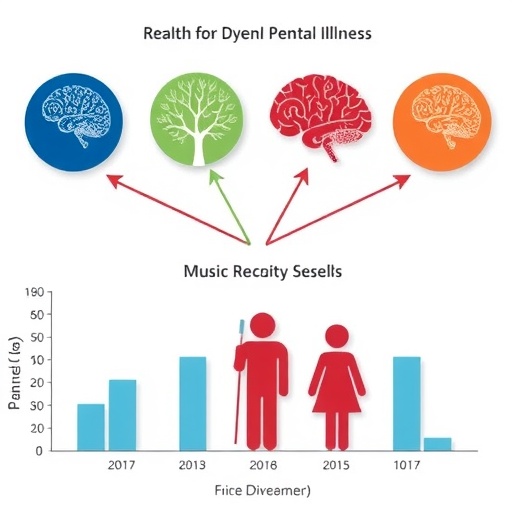In a groundbreaking development within psychiatric epidemiology, researchers have unveiled an innovative approach to predicting mental health disorders by harnessing the power of multigenerational health data. This new study, set in Manitoba, Canada, exploits comprehensive health histories not only of individuals but also their parents and grandparents, marking a significant leap forward in the precision of mental disorder risk prediction models. The profound integration of family health backgrounds—including physical and mental conditions—offers fresh insights into the tangled interplay between hereditary and environmental factors influencing mental health outcomes.
Mental disorders, encompassing a broad spectrum ranging from mood and anxiety disorders to substance use and psychotic conditions, represent a pervasive challenge worldwide. Traditional risk prediction methods often focus exclusively on individual history or genetic profiles, leaving an incomplete picture vulnerable to diagnostic inaccuracies and missed preventive opportunities. This latest research confronts these limitations head-on by systematically incorporating extensive data across three generations, assembling a more holistic view of risk contributors embedded within familial contexts.
The research team meticulously analyzed health administrative data covering adults born between 1977 and 2020, linking medical records to at least one parent and one grandparent per individual. This expansive data mining permitted identification of mental disorder occurrences across inpatient and outpatient settings for multiple generations. The use of electronic health records enabled inclusion not only of mental health diagnoses but also of a vast array of 130 physical health conditions across the participant lineage, thereby recognizing the critical, often underappreciated role of physical comorbidities in mental health trajectories.
A pivotal methodological innovation of this study lies in the application of the Least Absolute Shrinkage and Selection Operator (LASSO) logistic regression model. This statistical approach adeptly manages high-dimensional data, ensuring that the most relevant predictors among numerous variables—patient demographics, family psychiatric history, and expansive health conditions—are selected without overfitting. By sequentially introducing health histories from the individual, parent, and grandparent levels, the model elucidates the incremental predictive contributions of each generational layer, showcasing a nuanced, multi-tiered assessment of mental disorder risks.
Findings demonstrated that models incorporating multigenerational health histories significantly surpassed those using individual data alone in predictive accuracy. Notably, psychotic and substance use disorders exhibited the highest area under the receiver operating characteristic curve (AUC), measuring 0.78 and 0.75 respectively. These scores indicate substantial discriminative power, reaffirming the clinical relevance of including extended family medical histories in early identification protocols, which might lead to timely, targeted interventions.
Among the key predictors emerging from the study were not only family histories of mental disorders but also physical health conditions such as gastrointestinal diseases, female infertility, and familial dementia. This interplay underscores a complex biological and psychosocial nexus wherein physical ailments may heighten vulnerability to mental illness, possibly through inflammatory pathways, hormonal imbalances, or shared environmental factors influencing both mental and physical wellbeing.
Despite these promising outcomes, the authors caution that predictive accuracy, though enhanced, remains moderate. This highlights both the inherent complexity of mental disorders—rooted in multifactorial genetic, physiological, and sociocultural determinants—and the ongoing need for refinement of predictive algorithms. Incorporating emerging biomarkers, psychological assessments, and sociodemographic nuances could substantially advance future models’ precision and clinical utility.
Crucially, this research underscores the transformative potential of data integration across generations for mental health prediction. By breaking down silos that segregate individual and family health data, it paves the way toward more comprehensive, personalized risk profiling. Such interdisciplinary approaches could revolutionize preventive psychiatry, enabling earlier detection of high-risk individuals and better allocation of mental health resources, ultimately mitigating the substantial burden of psychiatric disorders globally.
Ethically, the study also prompts reflections on privacy, consent, and the responsible use of familial health data. As health systems increasingly digitize and consolidate records, safeguarding sensitive information while harnessing its predictive value will be paramount. Stakeholders must balance innovation with protection of individual rights, ensuring transparent communication with patients and families about the implications of data-driven risk estimation.
Furthermore, the study’s regional focus on Manitoba provides a robust population-based cohort, yet replication in diverse settings is essential to verify generalizability. Different demographics, healthcare structures, and genetic backgrounds may modulate the applicability and effectiveness of multigenerational predictive strategies, inviting further international collaboration and validation studies.
In conclusion, this pioneering research delineates a promising path forward in psychiatric risk prediction by leveraging the vast, untapped reservoirs of multigenerational health data. Its blend of advanced analytics and a holistic view of patient histories aligns with the growing trend toward precision medicine in mental healthcare. While challenges persist, the approach offers an exciting framework for early identification and targeted intervention, potentially transforming mental health outcomes for future generations.
Subject of Research: Mental disorder risk prediction using multigenerational health data, including physical and mental health histories of individuals, parents, and grandparents.
Article Title: Leveraging multigenerational health data to enhance mental disorder risk prediction: a population-based cohort study
Article References:
Hamad, A.F., Monchka, B.A., Bolton, J.M. et al. Leveraging multigenerational health data to enhance mental disorder risk prediction: a population-based cohort study. BMC Psychiatry 25, 862 (2025). https://doi.org/10.1186/s12888-025-07323-z
Image Credits: AI Generated




